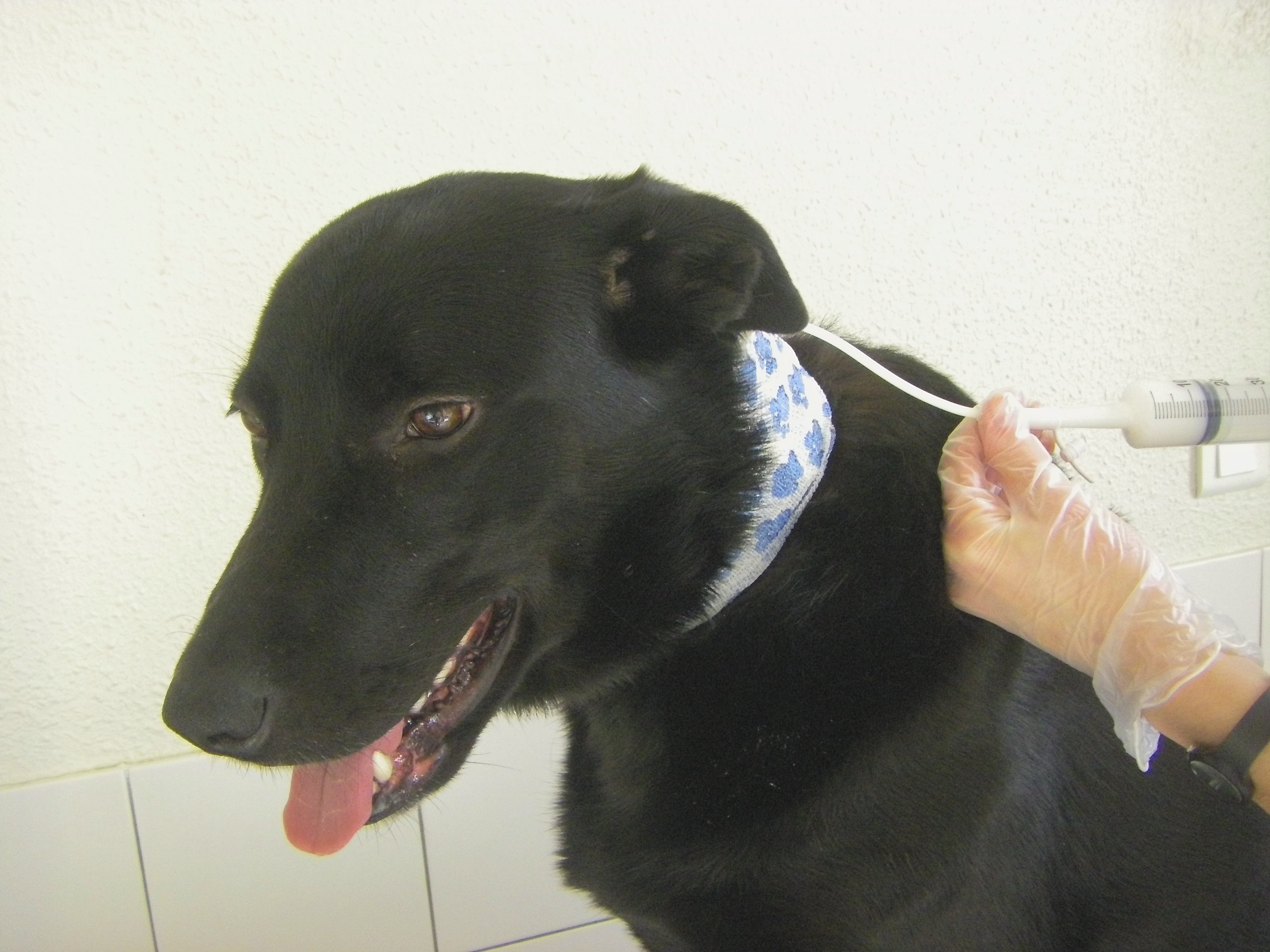Pancreatitis in dogs
Pancreatitis in dogs is a severe disease that can affect man's best friend at any age and regardless of breed. This pathology, which can be chronic or acute, consists of an inflammation of the pancreas that causes pain and digestive disorders in the dog.
Despite advances in veterinary treatments for dog pancreatitis, it is still difficult to detect and treat. Learning to recognize the symptoms of pancreatitis is therefore essential to provide your four-legged friend with early treatment, which significantly improves his health prognosis.
What is dog pancreatitis?
Dog pancreatitis is an inflammation of the pancreas, a vital organ located in the abdomen, just behind the stomach. The pancreas plays an important role in the digestion of food, especially fatty foods.
It also has an endocrine role, and is responsible for producing the famous insulin, a hormone that regulates blood sugar levels. Pancreatitis is a pathology resulting from a virulent or latent inflammation of the pancreas, which can severely or not hinder its functioning. This condition can take an acute or chronic form.
The acute form is often virulent and brutal and can be life threatening in the short term, but is often completely reversible. The chronic form is more insidious and evolves silently over the long term, eventually leading to irreversible fibrosis of the pancreas, resulting in the death of the animal.
Dogs over 5 years of age are more prone to chronic forms of pancreatitis, while acute forms can plague animals of any age. Certain breeds, such as Cocker Spaniels, Boxers and Terriers, are predisposed to the development of chronic pancreatitis.
The different types of pancreatitis in dogs
Acute pancreatitis in dogs
Acute pancreatitis manifests itself by a temporary, sudden and fulminant crisis, generally isolated (without recurrence). This form of pancreatitis can rapidly worsen and requires emergency veterinary care. In the absence of adequate care, the prognosis of the dog is vital.
It is often of exogenous origin, i.e. caused by one or more external factors (bacteria, parasites, trauma, poisoning...). In most cases, acute pancreatitis can be treated without the dog suffering any lasting damage, as the pancreas regains its full functionality.
Chronic Pancreatitis in Dogs
Although not an absolute veterinary emergency, chronic pancreatitis is often considered more dangerous than the acute form. It manifests itself in regular and repetitive attacks and causes latent symptoms, sometimes very discreet, which hinder its diagnosis. In fact, it is often detected at a late stage of its evolution.
Acute attacks can also occur in chronic pancreatitis. Most often, chronic pancreatitis in dogs is caused by a metabolic dysfunction, sometimes of genetic origin. Chronic pancreatitis cannot be cured, because the tissues of the pancreas that have been damaged by the disease cannot regenerate. It goes away on its own when the organ is completely destroyed.
However, don't despair if your dog has the disease: daily care, including a healthy lifestyle, can often control the symptoms over the long term and give the dog a near-normal life expectancy in good conditions. However, in order to offer a good prognosis to your pet, it is essential to manage his pathology as soon as possible, while the pancreas is still functional.

Symptoms of dog pancreatitis
The symptoms of acute pancreatitis in dogs are not very specific and are mainly digestive. Mostly, there is vomiting, often bile (yellow or greenish, liquid and sometimes slightly translucent) or white and frothy (gastric juices), sometimes hemorrhagic. The dog may have a fever, and will often show signs of pain, remaining prostrate and depressed, sometimes adopting antalgic postures. A loss of appetite associated with weight loss is often observed.
In the most severe forms, complications occur at various metabolic levels. Renal insufficiency, coagulation disorders, arrhythmia and respiratory distress are all symptoms that can indicate significant damage to the pancreas. When severe general symptoms appear, the prognosis of the dog is often poor, as the damage to the pancreas is not always reversible.
Chronic pancreatitis usually has a completely asymptomatic course in its early stages, until an acute attack occurs when the organ is already well damaged. In some cases, the dog may have progressive, long-term digestive symptoms.
Foamy or bile-like vomiting is quite typical of the disease. At the beginning, they are episodic, which does not worry the owner, but then tend to become more frequent until the animal loses its appetite and becomes visibly thinner. When the pancreas is heavily fibrotic (between 80% and 90% of the tissue), diabetes mellitus and pancreatic insufficiency appear.
Causes of pancreatitis in dogs
The causes of pancreatitis in dogs are multiple, and are not systematically elucidated - in which case they are called idiopathic pancreatitis. However, a number of factors have been shown to be involved in the occurrence of acute pancreatitis and may influence the development of chronic forms.
Pancreatitis in dogs and the diet
Whenever a digestive system disorder is involved, diet is one of the main suspects and should be investigated. A high fat intake could overtax the pancreas, leading to eventual dysfunction of this organ. Food intolerances could also be involved, especially since there is no shortage of ingredients that irritate the digestive system in industrial dog food.
Artificial additives, poor quality proteins, indigestible fibers and dubious fats... Some kibbles, especially low-end recipes, contain a good number of foods that can harm the pancreas of our dogs. If some dogs tolerate these foods very well, it should be noted that all our companions are not equal, and that pancreatitis is often multifactorial. Low quality food is probably not responsible for canine pancreatitis, but combined with other environmental factors or given to a dog that is already prone to digestive inflammation, it can wreak havoc.
Pancreatitis in dogs and infectious diseases
Certain pathogens can lodge in the dog's pancreas and proliferate peacefully, generating an immune response that results in a more or less virulent local inflammation. Different types of infectious agents can be involved. Parasitosis, parasitic infections, are likely to reach the pancreas and cause severe inflammation, sometimes lethal. Toxoplasmosis may be involved, although it is not well described in the literature, as well as Babesiosis, transmitted by ticks, and Leishmaniasis, transmitted by mosquitoes.
Note that most dog parasites are transmitted to humans, and are passed on to your dog by external parasites (fleas, ticks, mosquitoes, etc.). Antiparasitic treatments are therefore essential to protect your pet... and yourself! Finally, it has been suggested that certain bacterial infections, notably Ehrlichiosis and Leptospirosis, could play a role in the occurrence of pancreatitis in dogs, although this is not yet well known.
Canine pancreatitis and metabolic diseases
Various metabolic disorders may also be involved in the development of canine pancreatitis. Hormonal disorders, such as diabetes mellitus, hypothyroidism or hyperadrenocorticism, can alter the function of the pancreas and ultimately damage its tissues. It is still difficult to determine whether diabetes mellitus is a cause or a consequence of pancreatitis, as the two phenomena are closely linked. Disorders of lipid (hyperlipidemia) and calcium (hypercalcemia) metabolism are known to play a fundamental role in the occurrence of pancreatitis in dogs.
Pancreatitis in dogs and obesity
Obesity in dogs is a well-known risk factor, but also a serious factor, which significantly worsens the prognosis of the animal in case of pancreatitis. It is often associated with hyperlipidemia and a poor quality diet, which the dog digests poorly and which leads to recurrent inflammation of the digestive system.
Pancreatitis in dogs and genetics
The prevalence of chronic pancreatitis in the Miniature Schnauzer suggests a genetic background, although this is not formally elucidated. A mutation in a gene controlling one of the digestive hormones of the pancreas could indeed lead to a particular disorder involving self-digestion of the pancreas. The Cocker Spaniel is plagued by a specific form of chronic pancreatitis of immune origin that results in the appearance of typical fibrous lesions.
Pancreatitis in dogs and gastroenteritis diseases
Diseases of the digestive system, whatever their cause (gastritis, gastroenteritis, etc.) and whatever their cause (bacterial infection, IBD, food intolerance...) are proven factors of pancreatitis. Regular inflammation of the digestive organs favors the establishment of a constant inflammatory environment, which is likely to spread, at one time or another, to the pancreas.
Pancreatitis in dogs and toxins and medications
Certain medications can damage the pancreas, such as estrogen (birth control pills) and certain anti-tumor drugs (chemotherapy). Epileptic patients are also more at risk, as anticonvulsants can promote inflammation of the pancreas. Scorpion venom, which your dog is unlikely to be exposed to, is also known to cause acute pancreatic attacks. Finally, trauma (shocks, falls, etc.) can cause pancreatic damage, as can tumors and certain local functional abnormalities (obstruction of the pancreatic duct, duodenal reflux, etc.). Finally, the age of the dog is also a risk factor for chronic pancreatic disease, as is stress.

Treatment and prognosis of dog pancreatitis
In the short term, chronic and acute pancreatitis are treated in the same way, by managing their symptoms. Infusion may be considered to rehydrate and stabilize the animal depending on its general condition.
Antiemetics (anti-vomiting) and gastric dressings are often required when digestive symptoms are observed. Antibiotics may also be prescribed, either when a bacterial cause is suspected, or as a preventive measure, to avoid an opportunistic infection when the organ is weakened.
Further investigations are then necessary to pinpoint the cause of the dog's ailments (poisoning, drugs, parasites, etc.) and eliminate them, especially in acute forms. In the chronic forms, a life-long treatment is essential. This treatment does not necessarily involve medication, especially in the early stages of the disease, but rather a strict diet to relieve the pancreas and the entire digestive system.
When other disorders are associated with chronic pancreatitis, such as diabetes mellitus, the animal's lifelong treatment must also address them. The prognosis for the dog varies from case to case: moderate acute pancreatitis that is properly treated often offers a full recovery and is relatively well treated.
Severe acute pancreatitis can leave permanent damage, resulting in chronic pancreatitis. In a severe attack, the dog's prognosis is life-threatening and the mortality rate remains high despite veterinary care. In the case of chronic pancreatitis, the prognosis is good when the disease is managed early, and worse when the pancreas is already very deteriorated at the time of diagnosis.
FAQ
What should I do if my dog has pancreatitis?
If you suspect your dog has pancreatitis, it is essential to seek immediate veterinary care. A chronic form must be treated early to give your dog a good prognosis, and an acute form is life-threatening in the short term: it is an absolute emergency.
Can a dog recover from pancreatitis?
A dog can be completely cured of acute pancreatitis if it is treated in time. Chronic forms, on the other hand, do not offer a cure, but can be controlled for a long time, especially when treated early. A dog with chronic pancreatitis and a proper diet can live well for many years and even reach a normal life expectancy.
How to prevent pancreatitis in dogs?
A healthy, high-quality diet and maintaining a healthy weight are excellent ways to prevent chronic pancreatitis in dogs. Acute pancreatitis is more unpredictable, but it is possible to protect your dog with regular antiparasitic treatment, as fleas, ticks and mosquitoes are vectors of pathogens that can cause pancreatitis.
How do I know if my dog has asymptomatic pancreatitis?
The chronic form of pancreatitis often causes no symptoms in its early stages and does not manifest itself until it is "too late", i.e. when the pancreas is already severely affected. The best way to prevent this is to keep a close eye on your dog's health, help him maintain a healthy weight, feed him properly and have annual check-ups with your veterinarian.
Learning that your dog has chronic pancreatitis can be very anxiety-provoking, but it is important not to give up when you hear this news: your dog can live for years quite normally with the right lifestyle. Although pancreatitis is a serious condition, it is not necessarily fatal in the short or medium term.
A healthy and balanced diet, maintaining a good physical condition and regular check-ups with a veterinarian are excellent ways to prevent it and to take care of it as soon as possible, which offers the dog a favorable prognosis.

